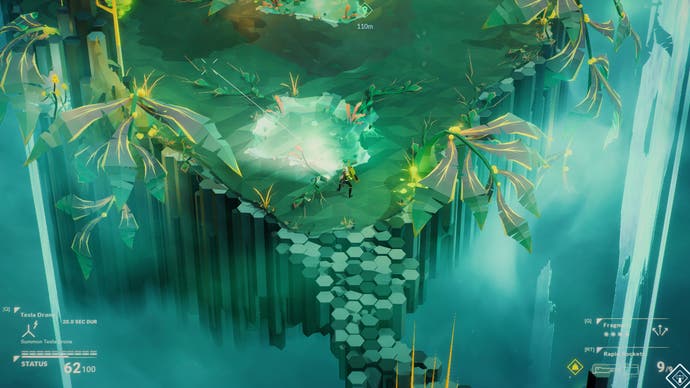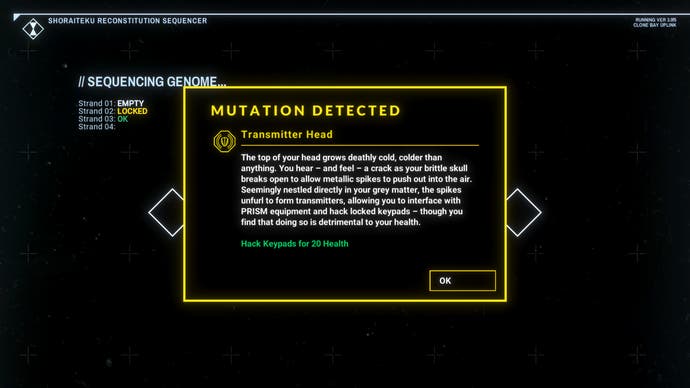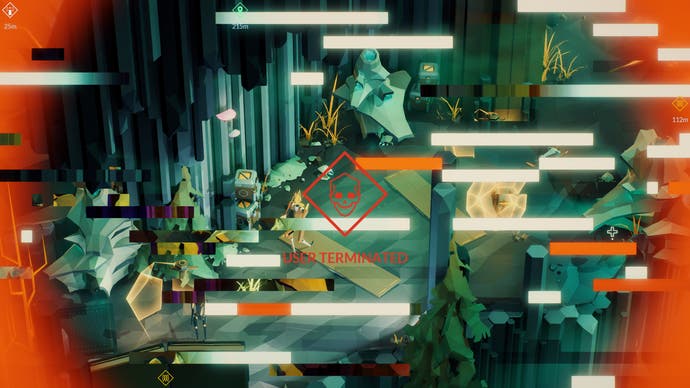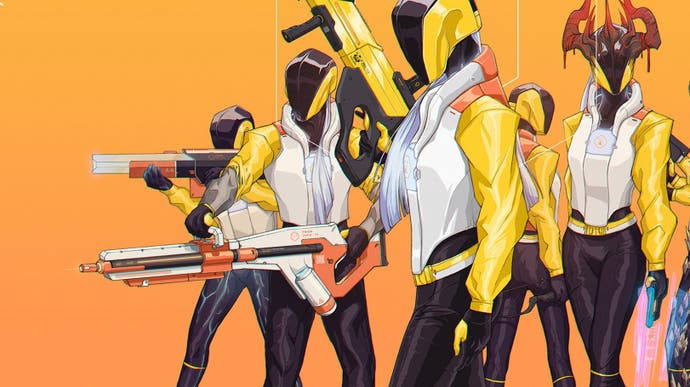Gorgeous cyberpunk shooter Beacon is about dying to survive
Clone alone.
The work of San Francisco-based studio Monothetic, Beacon is the tale of Freja Akiyama, a mercenary starpilot who crashlands on a sumptuous uncharted planet, but she isn't the person you actually play. Poor old Freja is, in fact, obliterated on impact along with most of her ship. Fortunately, the one piece of equipment left intact is your vessel's cloning pod, which promptly cooks up a brand new Freja to explore the game's procedurally generated environments, fight obscure species and scrape together the parts for a distress beacon.
Die, which should happen pretty often, and you'll be thrust into the boots of another Freja, way back at the crash site. To begin with the clones are identical, each sporting the same acid-yellow puffer jacket and ribbon of silver hair, but every time you respawn, you can plug in gobbets of genetic material from slain insectoids, reptiles and even robots to raise (or lower) your stats and unlock a variety of bizarre mutations.

I'm currently on Freja Mk 9 - the pod's loading screen display keeps a running total - and things are shaping up nicely. My chest has become a hard-wearing slab of chitin, somewhat ruining the cut of my jacket. Two horns have sprouted from my skull, each laced with electrical fibres: they're useless in battle, but I can hack keypads and terminals with them at some cost to my health. I'm faster and tougher than the Frejas who came before, but also clumsier, less capable of landing a critical hit. I'm also less lucky, which is hard to think of as a genetic trait, though the idea that some people are "born lucky" certainly has a foundation in social science. How many iterations of me, exactly, will it take to leave all this behind? Will there be anything of the original Freja left, when I finally get off this rock? Sifting through the wreckage of my ship as Freja Mk 5, I discover a dog-eared photograph of a smiling family - mother, father and daughter. Presumably these are Freja's parents. At this stage, does it even matter?
Out now in "First Access" on PC with an Xbox One version planned, Beacon is a relatively philosophical take on the familiar roguelike concepts of character permadeath and transferrable legacies, re-routing them through classic cyberpunk anxieties about selfhood and authenticity. It's a game that encourages you to leave your old identity - indeed, your sense of a fixed identity full stop - behind as you chase warped reflections through glorious, low-poly environments that are themselves in perpetual flux. Levels (four out of six are available in the First Access version) are bookended by memos from previous incarnations of Freja who congratulate you/them on making it this far, cheerily waving aside the thought of your/their repeated demise.
It's eerie and searching but also comes with a fairly light touch, with most of these existential convolutions latent in the shifting, recycling design of the game, rather than ladled on top as text. It also neatly reverses the generic video game premise of a human protagonist overrunning and profiting from an exotic alien world. This world has, after all, already killed you once, and if your doppelgängers are free to sponge up its resources, the price is the slow erosion of what makes you "you".

Such grandiose implications aside, Beacon makes a pretty engrossing top-down shooter, with a generous assortment of guns, auxiliary items and passive or active abilities to pit against an equally spicy line-up of enemies and map variables. The immediate draw is the design of the terrain itself. As with Tokyo 42's diamond cityscape, Beacon's aesthetic is saturated and organic but unified by a simple geometric motif, the hexagon; this reflects the primary definition of "monothetic" offered by the developer's website manifesto, "pertaining to or based on a single basic idea or principle".
You start off on a crumbling basalt plateau, its clean facets blurred by glowing insect colonies or overwritten by the bases of your primary antagonists, the mysterious Prism robots. Later maps take you underground, where you'll find malfunctioning power plants, rivers of blue energy, prancing arachnid bosses and no end of rocket turrets. It's a gorgeous expanse, if not always an enjoyable one to navigate. The fixed camera occasionally cheats you of a clear view, though the game displays a yellow silhouette when you run behind something. After a few hours of play, I still fall to my death now and then or get myself boxed in because I can't quite make out ledges or low obstacles.
Each version of Freja begins with a splattery plasma pistol, but it's not long before you get your hands on sexier weapons such as laser rifles, hipfire rocket launchers and Tesla SMGs. There are also passive tools and consumables, such as drones who conjure up a lazily rotating energy shield, or balls of edible alien flora that supercharge your stats but are subject to crippling withdrawal symptoms. Larger encounters compare to arcade bullet hell shooters, with projectiles, scything blades and splash damage flying all over as you duck and dive, strafe and backpedal. The animations and NPC behaviours are quite crude in places - I could do with less in the way of rushdown tactics and a more pronounced sense of impact when I clobber something, to help me keep track of the battle. But on the whole it's a lot of fun, and then there are the mutations, Beacon's signature tricks.

Before each respawn you can plug up to five pieces of DNA into a sequencer to customise Freja's stats. When sequenced, each lump of genetic material has a chance of unlocking a mutation, which is then permanently associated with that piece. Not every mutation has positive effects: witness the sad case of Freja Mk 3, who emerged from the pod with brittle bones and thus a chance of briefly incapacitating herself whenever she dodged an attack. You won't know which DNA strand corresponds to which mutation till you plug it in, so it's worth experimenting with less desirable strands to see what they produce - at the risk, naturally, of creating a Freja with all the survivability of a turnip in a pigsty.
There are many, I'm sure, who will see Beacon's cloning premise not as some buried philosophical conundrum but just as a narrative excuse for the player's ability to try again. You could also argue that the DNA sequencing merely respins ideas from other roguelikes, specifically Rogue Legacy, in which each protagonist is the previous one's descendent. I guess we'll see how things pan out in the final release, but Monothetic doesn't strike me as a studio that will content itself with iterating on a genre formula. Intriguingly, the developer's site also defines “monothetic” as referring to “a classification that is defined by the presence of all of a set of attributes” - not just "a single basic idea or principle" but one resulting from a combination of things. This speaks directly to the weirdness of a game in which the heroine is at once an individual and a self-replicating Frankenstein's amalgamation of everything she has fought along the way - a tale of nonhuman encounters in which you'll trade away your vaunted humanity, bit by bit, for the chance to live on, in whatever form living may take.

